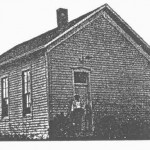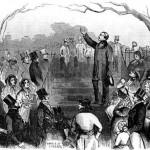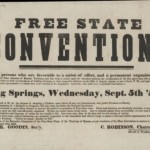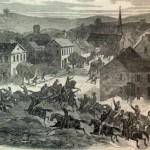The global economic crisis of 2008 has been traced to a range of factors from market deregulation to massive inflation in the price of commodities. 135 years earlier, however, the first transcontinental railroad’s financial collapse was tagged as the chief trigger of a national depression that endured for most of the 1870s. Putting a finer point on it, one Wall Street insider fingered a Hoosier scapegoat, saying, “It’s all Schuyler Colfax‘s fault, damn him.” The connection between the Hoosier newspaperman and the legendary debacle of the Gilded Age involves a story that takes us from St. Joseph’s County, Indiana all the way to the White House, and back. As a teenager, Schuyler Colfax began contributing columns on Indiana politics to Horace Greeley’s New York Tribune, before editing and quickly purchasing a South Bend newspaper. Journalism served to launch Colfax into his own political career. An anti-slavery Whig, Colfax was voted into Congress in 1855, rising to the position of Speaker of the House in 1863, and distinguishing himself the following year as a signatory on the resolution to adopt the 13th amendment to the Constitution, abolishing slavery. Around the same time that his stock was rising in Washington, the first Speaker of the House to become Vice-President accepted a gift of stock that would be his undoing. Among a number of Senators and Representatives, Vice-President Colfax was implicated as an owner of stock in Credit Mobilier, a company being heavily subsidized by federal funds to build the Union Pacific Railroad-one of the largest incidents of graft in American history. Although some of the politicians involved recouped their careers in Washington, Colfax was removed from the ticket for President Grant’s second term, and he returned to South Bend.
-
Indiana Public Media
- Indiana Public Media Home
- Radio
- TV
- News
- Arts & Culture
-
All Programs
- A Moment of Science
- Afterglow
- Community Minute
- Earth Eats
- Ether Game
- Focus on Flowers
- The Friday Zone
- Harmonia
- Indiana Newsdesk
- Indiandroid
- Just You & Me
- Moment of Indiana History
- Night Lights Classic Jazz
- Noon Edition
- The Poets Weave
- PorchLight
- Profiles
- Classical Music
- Sylvia and Friends
- Soul Kitchen
- Journey Indiana
- Events
- Support
- Services
- Contact
- Broadcast Status
- Search


Give Now »

-
Programs
- Afterglow
- Ask the Mayor
- Classical Music
- Community Minute
- Earth Eats
- Ether Game
- Focus on Flowers
- The Friday Zone
- Harmonia
- Indiana Newsdesk
- Indiandroid
- Journey Indiana
- Just You & Me
- A Moment of Science
- Night Lights Classic Jazz
- Noon Edition
- The Poets Weave
- PorchLight
- Profiles
- Soul Kitchen
- Sylvia and Friends
- Podcasts
- Video
Give Now
»



















